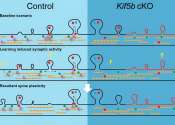Cell Reports is an open-access journal from Cell Press that publishes high-quality papers across the entire life sciences spectrum. The primary criterion for publication in Cell Reports, as for all Cell Press journals, is new biological insight. Cell Reports publishes thought-provoking, cutting-edge research, with a focus on a shorter, single-point story, called a Report, in addition to a longer Article format. Cell Reports also publishes Resources, which highlight significant technical advances and/or major informational data sets.
- Publisher
- Cell Press
- Website
- http://cellreports.cell.com/
Some content from Wikipedia,
licensed under CC BY-SA









